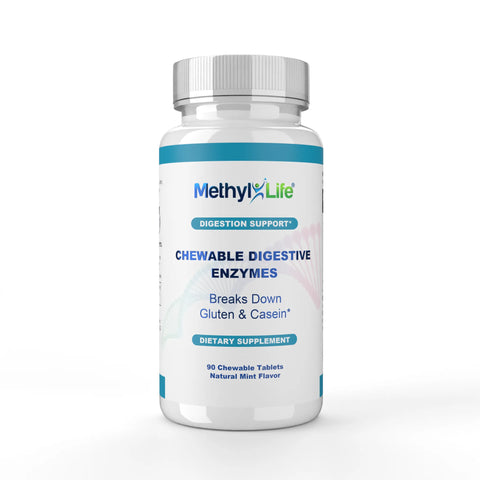
The Benefits of Probiotics
Product Recommendations
Chewable Digestive Enzymes
$46.00
- Ease Your Belly from Post Meal Discomfort
- Assists Breakdown of Proteins, Carbohydrates, Lipids, Gluten & Dairy
- Tastes like a natural, after-dinner mint
- 3rd-Party Tested, Non-GMO, Gluten-Free, 90 Vegan Tablets

Written By:
Katie Stone - Naturopath
Medical Reviewer:
Dr. Nare Simonyan - PhD Pharmaceutical Science
Edited By:
Kari Asadorian - BSN, RNUpdated On:
June 16, 2025What are probiotics?
Probiotics are live bacteria and yeasts that can provide health benefits when taken in sufficient quantities.
Probiotic supplements play important roles in the healthy functioning of the mind and body, particularly in supporting digestive health, the immune system and brain function.
Digestive support
Probiotics assist digestion by producing enzymes required for the breakdown of food in the gut, particularly complex carbohydrates and fibers that the body cannot digest on its own.1 They also support the integrity of the gut lining and aid absorption of key nutrients, such as vitamins and minerals.
Probiotics produce short-chain fatty acids (SCFAs) such as butyrate and other metabolites that can be used by the body for energy, as well as reducing inflammation and supporting the function of the intestinal barrier.2
Reduce risk of antibiotic-associated diarrhea
Certain strains of probiotics (such as Saccharomyces boulardii) alongside antibiotic treatment can reduce the risk of antibiotic-associated diarrhea.3
Support immune function
Probiotics promote production of mucins - protective substances in the gut lining that help to prevent the entry of pathogenic microorganisms.4 They also support tight junction proteins, which help seal the gaps between cells in the gut lining.
Certain strains interact with immune cells (dendritic cells, macrophages and lymphocytes) and improve their activity and function. They also promote the production of antimicrobial peptides and cytokines which help to fight infection, and compete with harmful bacteria for nutrients and adhesion sites in the gut, crowding out pathogens.5
Reduce depression
Research suggests specific probiotic strains may reduce symptoms of depression by increasing levels of brain-derived neurotrophic factor (BDNF) or GABA, which supports healthy mood. Probiotics also promote SCFAs that help in reducing neuroinflammation caused by bacterial imbalance (dysbiosis) and disruption to the gut-brain axis.7
The metabolic function of probiotics
Probiotics may help to improve blood lipid profiles, insulin sensitivity and glucose regulation.8 In people who are overweight or obese, probiotics may help to reduce weight and prevent further weight gain.9
The benefits of probiotics for women
Probiotics play a vital role in supporting women’s health throughout life. Estrogen levels fluctuate significantly between puberty to menopause and postmenopause, as well as across menstrual cycles and pregnancy. These fluctuations can affect the microbiota composition of the vagina, causing imbalance and/or infection. Probiotics support microbial balance during these stages of life, as well as during antimicrobial treatment or dysbiosis.
- Specific strains of probiotics can help reduce and prevent infections such as bacterial vaginosis and candidiasis. Specific Lactobacillus strains are found to help restore a healthy balance of bacteria in the vagina, lowering the pH and inhibiting the growth of harmful pathogens.10
- Lactobacillus strains help to restore vaginal pH and healthy microbial levels in women undergoing hormone replacement therapy (HRT). Specific strains were also found to improve menopausal symptoms including vaginal dryness.11
- Daily supplementation with Lactobacillus may help to reduce menstrual pain and dysmenorrhea in women with endometriosis, and also improve quality of life.12
- In women with PCOS (polycystic ovarian syndrome), probiotics were found to significantly reduce fasting blood glucose, insulin levels and insulin resistance. They also helped to reduce cholesterol, luteinizing hormone and testosterone levels.13
Please note that women who are pregnant or breastfeeding should speak to their healthcare professional before taking probiotics.
The benefits of probiotics for men
Probiotics may support prostate health and fertility in men, as well as metabolism and cognitive function.
- Probiotics were found to significantly improve benign prostatic hyperplasia (BPH), a non-cancerous enlarged prostate, by reducing oxidative stress and inflammation, increasing testosterone and serotonin, and restoring key BPH-related hormones to normal levels.14
- A systematic review found that probiotic supplementation significantly improved sperm quality, motility and DNA protection in men with idiopathic infertility by reducing oxidative stress and reactive oxygen species.15
- Probiotics effectively reduced prostate inflammation caused by bacterial infection, suggesting supplementation could also help prevent bacterial prostatitis and support prostate health.16
- Probiotics can effectively remove cholesterol from the bloodstream, improving lipid metabolism, enhancing immune response without triggering inflammation and potentially preventing obesity and diabetes.17



Product Recommendations
Chewable Digestive Enzymes
$46.00
- Ease Your Belly from Post Meal Discomfort
- Assists Breakdown of Proteins, Carbohydrates, Lipids, Gluten & Dairy
- Tastes like a natural, after-dinner mint
- 3rd-Party Tested, Non-GMO, Gluten-Free, 90 Vegan Tablets
Frequently Asked Questions about the benefits of probiotics
Probiotics have benefits for most bodily systems. They help to restore gut bacteria balance and reduce digestive issues, assist with nutrient absorption and prevent and treat diarrhea (including antibiotic-associated diarrhea). Probiotics also support the immune response and the function of immune cells, including respiratory infections. For women, probiotics may help to prevent urinary and vaginal infections and reduce symptoms associated with PCOS and endometriosis. Probiotics also support skin health and cardiovascular function.
Probiotics help to restore the balance of healthy bacteria in the gut microbiome, which is central to digestion and immune function.
Yes, especially if your gut microbiome is out of balance. Taking a quality probiotic supplement every day can help to restore healthy balance.
If you are taking probiotics in powder or liquid form, they should not be added to hot or highly acidic food. Heat and acid can damage the viable bacteria.
Certain medications - such as immunosuppressants and steroids - may interact with probiotics. Talk to your healthcare professional if you are taking these medications.
Antibiotics should be taken at least two hours away from probiotics, and it’s important to take a probiotic designed for antibiotic use, such as Saccharomyces boulardii.
References
-
Sujuan Ding, Wenxin Yan, Yong Ma, Jun Fang; "The impact of probiotics on gut health via alternation of immune status of monogastric animals"; Animal nutrition; 2020 Dec
https://pmc.ncbi.nlm.nih.gov/articles/PMC8110871
-
Ygor Parladore Silva; Andressa Bernardi; Rudimar Luiz Frozza; "The Role of Short-Chain Fatty Acids From Gut Microbiota in Gut-Brain Communication"; Frontiers in Endocrinology; 2020 Jan
https://www.frontiersin.org/journals/endocrinology/articles/10.3389/fendo.2020.00025/full
-
Stephan Ehrhardt, Nan Guo, Rebecca Hinz, Stefanie Schoppen, Jürgen May, Markus Reiser, Maximilian Philipp Schroeder, Stefan Schmiedel, Martin Keuchel, Emil C Reisinger, Andreas Langeheinecke, Andreas de Weerth, Marcus Schuchmann, Tom Schaberg, Sandra Ligges, Maria Eveslage, Ralf M Hagen, Gerd D Burchard, Ansgar W Lohse, for the SacBo Study Group; "Saccharomyces boulardii to Prevent Antibiotic-Associated Diarrhea: A Randomized, Double-Masked, Placebo-Controlled Trial"; Open forum infectious diseases; 2016 Jan
https://pmc.ncbi.nlm.nih.gov/articles/PMC4785405/
-
Y H Chang, C H Jeong, W N Cheng, Y Choi, D M Shin, S Lee, S G Han; "Quality characteristics of yogurts fermented with short-chain fatty acid-producing probiotics and their effects on mucin production and probiotic adhesion onto human colon epithelial cells"; Journal of dairy science; 2021 Jul
https://pubmed.ncbi.nlm.nih.gov/33814147/
-
Ye Eun Ra, Ye-Ji Bang; "Balancing Act of the Intestinal Antimicrobial Proteins on Gut Microbiota and Health"; The journal of microbiology; 2024 Apr
https://pmc.ncbi.nlm.nih.gov/articles/PMC11090926
-
Jie Gao, Longyou Zhao, Yiwen Cheng, Wenhui Lei, Yu Wang, Xia Liu, Nengneng Zheng, Li Shao, Xulei Chen, Yilai Sun, Zongxin Ling, Weijie Xu; "Probiotics for the treatment of depression and its comorbidities: A systemic review"; Frontiers in cellular and infection microbiology; 2023 Apr
https://pmc.ncbi.nlm.nih.gov/articles/PMC10149938
-
Sharma Sonali, Bipul Ray, Hediyal Ahmed Tousif, Annan Gopinath Rathipriya, Tuladhar Sunanda, Arehally M Mahalakshmi, Wiramon Rungratanawanich, Musthafa Mohamed Essa, M Walid Qoronfleh, Saravana Babu Chidambaram, Byoung-Joon Song; "Mechanistic Insights into the Link between Gut Dysbiosis and Major Depression: An Extensive Review"; Cells; 2022 Apr
https://pubmed.ncbi.nlm.nih.gov/35456041/
-
Yanming Wang, Dinareer Dilidaxi, Yuche Wu, Jialehasibieke Sailike, Xin Sun, Xin-hua Nabi; "Composite probiotics alleviate type 2 diabetes by regulating intestinal microbiota and inducing GLP-1 secretion in db/db mice"; Biomedicine & Pharmacotherapy; 2020 May
https://www.sciencedirect.com/science/article/pii/S0753332220301049
-
Belén Torres, María C Sánchez, Leire Virto, Arancha Llama‐Palacios, María J Ciudad, Luis Collado; "Use of probiotics in preventing and treating excess weight and obesity. A systematic review"; Obesity science & practice; 2024 Jun
https://pmc.ncbi.nlm.nih.gov/articles/PMC11187407/
-
Andrea M Zuñiga Vinueza; "Probiotics for the Prevention of Vaginal Infections: A Systematic Review"; Cureus; 2024 Jul
https://pmc.ncbi.nlm.nih.gov/articles/PMC11318795
-
Min Gu Park, Seok Cho, Mi Mi Oh; "Menopausal Changes in the Microbiome—A Review Focused on the Genitourinary Microbiome"; Diagnostics (Basel); 2023 Mar
https://pmc.ncbi.nlm.nih.gov/articles/PMC10047399/
-
Hiroyuki Itoh, Masayuki Uchida, Toshihiro Sashihara, Zai-Si Ji, Ji Li, Qianjue Tang, Shuang Ni, Linyi Song, Shuichi Kaminogawa; "Lactobacillus gasseri OLL2809 is effective especially on the menstrual pain and dysmenorrhea in endometriosis patients: randomized, double-blind, placebo-controlled study"; Cytotechnology; 2010 Dec
https://link.springer.com/article/10.1007/s10616-010-9326-5
-
Yuling Li, Yong Tan, Guicheng Xia, Jiaqi Shuai; "Effects of probiotics, prebiotics, and synbiotics on polycystic ovary syndrome: a systematic review and meta-analysis"; Critical Reviews in Food Science and Nutrition; 2021 Jul
https://www.tandfonline.com/doi/abs/10.1080/10408398.2021.1951155
-
Sara Ferrari, Rebecca Galla, Simone Mulè, Francesca Uberti; "Analysis of the Beneficial Effects of Probiotics on the Gut-Prostate Axis Using Prostatic Co-Culture Model"; Foods; 2024 Nov
https://pubmed.ncbi.nlm.nih.gov/39594064/
-
Licia Cristina Silva de Lima Oliveira, Elton Carvalho Costa, Fernanda Domingues Gomes Martins, Alcenir Sales da Rocha, Girlandia Alexandre Brasil "Probiotics supplementation in the treatment of male infertility: A Systematic Review"; JBRA assisted reproduction; 2024 Jun
https://pubmed.ncbi.nlm.nih.gov/38530761/
-
Stefania Murzilli, Vincenzo Mirone, Marta Micheletto, Erik Tedesco, Giovanni Di Maira, Federico Benetti, Arianna Vanelli; "Evaluation of the Immunomodulatory Effects of a Probiotics and Natural Extract-Based Formulation in Bacterial-Induced Prostatitis"; Life (Basel); 2023 Jan
https://pmc.ncbi.nlm.nih.gov/articles/PMC9965078/
-
Juhi Aggarwal, Gaurav Swami, Mayur Kumar; "Probiotics and their Effects on Metabolic Diseases: An Update"; Journal of clinical and diagnostic research; 2013 Jan
https://pmc.ncbi.nlm.nih.gov/articles/PMC3576782/

About the Author
Katie is a qualified Naturopath (BNatMed) and freelance writer from New Zealand. She specializes in all things health and wellness, particularly dietary supplements and nutrition. Katie is also a dedicated runner and has completed more half-marathons than she can count!
Related Articles

Like what you read?
Please subscribe to get more content like this sent to your inbox.
Share This Article
Trusted by Experts. Backed by Science.
Trusted professionals crafting original content backed by verified research. Since 2012, Methyl-Life® has been dedicated to providing evidence-based education to help individuals better understand methylation and nutritional wellness.
-

Expert-authored education
Every article and guide is written or reviewed by professionals specializing in methylation science and nutritional biochemistry.
-

Research-verified information
Our content references peer-reviewed studies and verified data, ensuring accuracy, integrity, and real-world relevance.
-

Educational leadership since 2012
A founder-led team collaborating with clinicians, researchers, and health writers to make complex science accessible and actionable.
-

Transparent and trustworthy
All educational materials undergo internal review for scientific accuracy, compliance, and clarity before publication.







